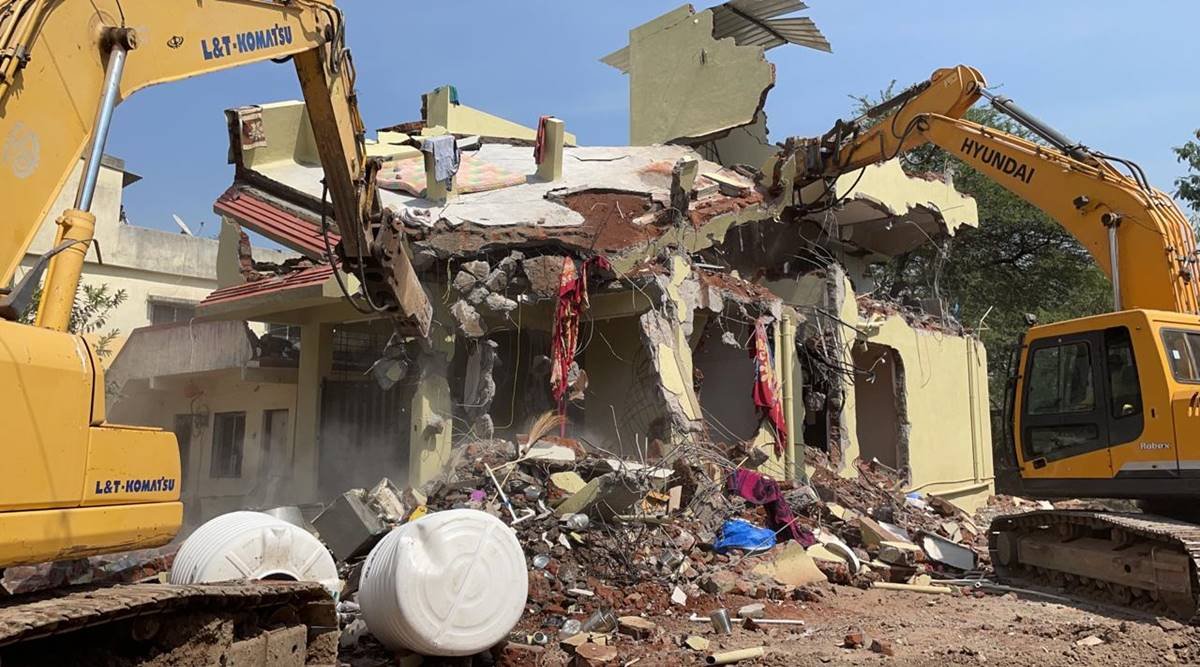PCMC Mega Demolition Drive Clears 465 Acres of Illegal Constructions
In a sweeping crackdown on illegal encroachments, the Pimpri Chinchwad Municipal Corporation (PCMC) has demolished 2,845 unauthorised structures across the Kudalwadi region of Chikhali, clearing 202.29 lakh square feet of land. The large-scale demolition drive, launched on 8th February under the leadership of PCMC Commissioner Shekhar Singh and Police Commissioner Vinoy Kumar Choubey, aims to reclaim planned development spaces that had been occupied by illegal tin sheds, factories, warehouses, and commercial setups. By the fifth day, approximately 40.57 lakh square feet—spanning 93 acres—had been freed from unauthorised occupancy, marking one of the largest urban clearance operations in recent years.
The extensive drive, carried out jointly by PCMC and the Police Administration, underscores the growing urgency to enforce zoning laws and maintain civic order. With municipal authorities pressing ahead with the demolition, residents and business owners have expressed mixed reactions. While many acknowledge the necessity of planned urban development, those affected by the demolitions have voiced concerns over the sudden loss of shelter and livelihood. “We had been running businesses here for years. There was no prior notice given to us, and now our entire setup is gone,” lamented a factory owner, highlighting the human cost of such large-scale operations.
A Coordinated Effort for Urban Governance and Safety
Executing a demolition drive of this magnitude requires meticulous planning and robust execution. The civic body has deployed 16 poclains, 8 JCBs, 1 crane, and 4 cutters to expedite the process. Additionally, a force of 600 police personnel and 180 Maharashtra Security Force members have been stationed in the area to prevent resistance or unrest. To ensure safety, the administration has also positioned three fire engines and two ambulances at the site. Senior officials, including Additional Municipal Commissioner Pradeep Jambhale Patil and Deputy Commissioner Manoj Lonkar, are supervising the clearance efforts, while law enforcement officials, including Joint Commissioner of Police Shashikant Mahavarkar and Additional Commissioner of Police Vasant Pardeshi, are overseeing security arrangements.
Municipal authorities have reiterated that this is just the beginning of a larger strategy to eliminate encroachments from planned development zones. “The joint operation by the PCMC and Police Administration aims to remove unauthorised structures from spaces earmarked for civic amenities and infrastructure. This action will continue to ensure that land is used for its intended purpose,” stated Additional Commissioner Pradeep Jambhale Patil. While the municipal body remains firm in its commitment to urban governance, activists argue that better rehabilitation measures should be implemented for those displaced.
Sustainability and Urban Development: Addressing the Root Cause
The demolition drive highlights the broader issue of unregulated urban sprawl and the need for sustainable urban planning. Illegal encroachments often emerge due to the lack of affordable housing and commercial spaces, forcing small businesses and residents to occupy unauthorised land. This situation calls for a long-term solution that balances enforcement with inclusive urban development policies. While clearing encroachments is necessary for maintaining planned infrastructure, providing alternative spaces and integrating sustainable housing policies should be a parallel priority.
PCMC’s operation also draws attention to environmental sustainability. The removal of unplanned structures contributes to better waste management, improved drainage systems, and controlled pollution levels. However, demolitions generate large amounts of debris, raising concerns about responsible disposal. Authorities must ensure that construction waste is repurposed or managed efficiently to prevent further environmental damage. Additionally, urban planners emphasise that future city layouts should incorporate eco-friendly infrastructure and regulated land use to prevent recurring encroachment crises.
Civic Responsibility and Future Urban Planning
The Pimpri-Chinchwad encroachment clearance is not just about reclaiming land but also about reinforcing civic order and urban governance. While the demolition drive aims to restore planned development spaces, it serves as a reminder of the pressing need for a comprehensive urban housing policy. To prevent the re-emergence of illegal settlements, authorities must focus on systematic zoning regulations, affordable housing initiatives, and public-private partnerships that facilitate sustainable city growth.
For residents, the demolition drive raises critical questions about civic responsibility. Encroachment is often the result of gaps in governance, unchecked land use, and the absence of long-term urban strategies. While the PCMC’s action addresses immediate concerns, future development plans must prioritise regulated growth, environmental sustainability, and equitable urban expansion. As the demolition drive continues, the challenge remains in ensuring that Pune’s growth is not just rapid but also resilient and inclusive.


